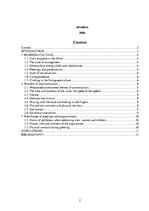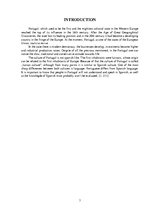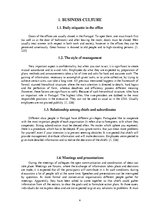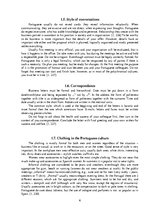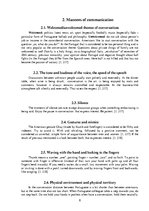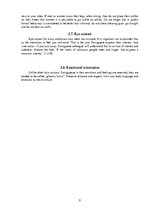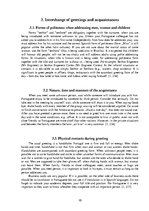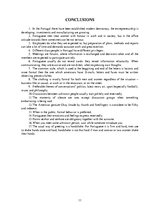-
Business Culture and Standards of Ethics in Portugal
| Nr. | Sadaļas nosaukums | Lpp. |
| Content | 2 | |
| INTRODUCTION | 3 | |
| 1. | BUSINESS CULTURE | 4 |
| 1.1. | Daily etiquette in the office | 4 |
| 1.2. | The style of management | 4 |
| 1.3. | Relationship among chiefs and subordinates | 4 |
| 1.4. | Meetings and presentations | 4 |
| 1.5. | Style of conversations | 6 |
| 1.6. | Correspondence | 6 |
| 1.7. | Clothing in the Portuguese culture | 6 |
| 2. | Manners of communication | 8 |
| 2.1. | Welcomed/unwelcomed themes of conversations | 8 |
| 2.2. | The tone and loudness of the voice, the speed of the speech | 8 |
| 2.3. | Silence | 8 |
| 2.4. | Gestures and mimics | 8 |
| 2.5. | Waving with the hand and looking to the fingers | 8 |
| 2.6. | Physical environment and physical territory | 8 |
| 2.7. | Eye contact | 9 |
| 2.8. | Emotional orientation | 9 |
| 3. | Interchange of greetings and acquaintances | 10 |
| 3.1. | Forms of politeness when addressing men, women and children | 10 |
| 3.2. | Nature, time and manners of the acqaintance | 10 |
| 3.3. | Physical contacts during greeting | 10 |
| CONCLUSIONS | 11 | |
| BIBLIOGRAPHY | 12 |
INTRODUCTION
Portugal, which used to be the first and the mightiest colonial state in the Western Europe reached the top of its influence in the 16th century. After the Age of Great Geographical Discoveries, the state lost its leading position and in the 20th century it had become a developing country in the fringe of the Europe. At the moment, Portugal, as one of the states of the European Union, starts to revive.
In the state there is modern democracy, the businesses develop, investments become higher and industrial production raises. Despite of all the previous mentioned, in the Portugal one can notice the slow, traditional and conservative attitude towards life.
The culture of Portugal is not spanish-like. The first inhabitants were lutisans, whose origin can be related to the first inhabitants of Europe. Because of that the culture of Portugal is called „lutisan culture”, although from many points it is similar to Spanish culture. One of the most sharp differences between both cultures is language: Portuguese differs from Spanish language. It is important to know that people in Portugal will not understand and speak in Spanish, as well as the knowlegde of Spanish most probably won’t be evaluated. [1, 211]
1. BUSINESS CULTURE
1.1. Daily etiquette in the office
Doors of the offices are usually closed in the Portugal. To open them, one must knock first (as well as at the door of bathroom) and after leaving the room, doors must be closed. Men usually treat women with respect in both work and society, however in the offices they can be perceived unseriously. Great honour is showed to old people and to high-standing persons. [1, 225]
…
Darbs pārtulkots no latviešu valodas


